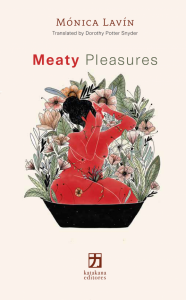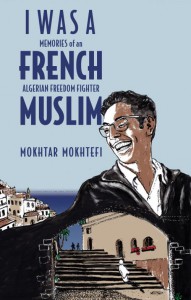This month, our editors dive into two powerful works that look into the dominating subjects of human life: sex and war. An erotically subversive collection of stories by award-winning author Mónica Lavín moves to the darkest and most questioning arenas of desire, and a memoir by Algerian Freedom fighter Mokhtar Mokhtefi stands as a cogent and compelling text of witness of his nation’s struggle against French colonialism.

Meaty Pleasures by Mónica Lavín, translated from the Spanish by Dorothy Potter Snyder, Katakana Editores, 2021
Review by Lindsay Semel, Assistant Managing Editor
There is catharsis in transgression, and pleasure—especially the centering of one’s own pleasure—is all too often transgressive. The twelve short stories in Mónica Lavín’s collection, Meaty Pleasures, thoughtfully curated and translated by Dorothy Potter Snyder, capitalizes on this subversive desire, exploding the tranquil veneer of domestic life by compelling our complicity in the deeply uncomfortable and socially taboo.
It all begins and ends with the flesh. “Postprandial,” the decadent opening story, foregoes grounding details about setting and character in order to focalize an aphrodisiac tasting menu, offered from a hotel restaurant manager to a passerby, and the explicit sex that follows. It readies the reader for Lavín’s challenging approach to realism, intimacy, and power imbalance which pervades the rest of the collection. The final story, “Meaty Pleasures,” also emphasizes the sensual relationship between food and sex—but in a completely different way. Told from the perspective of an adult daughter who has watched her parents’ Saturday afternoon artisanal butchering hobby grow into an obsession that echoes over the course of their lives, the sex is left entirely to the implicit, straining in constant tension with the parental web of familial obligations. The daughter and her sister reflect: “Sometimes we’d ask each other, have you tried calling Papá and Mamá on Saturday afternoons? Because on that day of week, they never answered the phone to either one of us.”
In between, we meet many a troubled family. As is common in stories of nonconformity, various characters rebel against the numbing effect of matrimony, but their resistance does not lead them to any predictable conclusion—or perhaps any predictability is heightened to a manic extreme. In “What’s there to come back to,” a husband leaves his repentant wife on their doorstep for a whole winter’s night before he, begrudgingly, allows her back into their home. Snyder’s translation captures a certain languor and resentment in his stream of consciousness that induces anxiety when set against the excruciating awareness of her waiting, building a rawness that painfully and coldly leads to his reflection upon waking up in the morning: “Fried eggs again for breakfast, the TV news. I think she’s gone. Maybe she froze to death. Maybe we both froze to death.” In “You Never Know,” a son tires of the demons left to him by his mother’s abandonment. “Then, you kiss and hug them in the shadows of a movie theater, and you masturbate thinking about them, and when you start to want something more than their bodies, like their companionship and tenderness, you leave without saying goodbye.” Innocent—righteous, even—though his anger seems, his journey darkens with an incestual turn. “Roberto’s Mouth” finds a disgruntled housewife disappointed yet again when her own plans to leave her family are thwarted by her naughty-mouthed chat-room lover’s lazy approach to cuckholding. In such narratives that continually unpack and distort the concepts of familial intimacy, images of transgressively penetrated flesh dominate the collection, inviting the reader to reflect on the discomfort they inspire.
In “The Perfect Woman,” the protagonist also leaves her family at the suggestion of a primal impulse. She’s an upper-class woman, like many of the female characters in the collection, whereas her seducer beckons to her from a bench in the park where he lives. When he repeatedly calls her the perfect woman, his words refer to her cleanliness, her fashion sense, her punctuality, and her sense of duty and propriety—all of which he, according to himself, lacks. But time suggests her perceived perfection has to do with something else. Once wealthy and propertied and now living in a maintenance shed and bathing in a fountain with the local whores, he repeatedly confesses that he was always imperfect, unworthy of his status. She, on the other hand, remains perfect, in his eyes, even after shedding the trappings of society. What characterizes, then, the perfect woman? Knowing so little of her, we can only speculate. But when she yields to him completely, there is an almost paradisiacal perfection in their life together; the incompleteness of a man alone becomes the completeness of a home. They want for nothing and nothing shames them.
Once again, this story exemplifies Snyder’s masterful interpretation of the tension Lavín has embedded. “His legs covered with those dirty pants were pressed up against mine, and he had taken my hand back. Cornered like that, any idea I had of getting up and walking away evaporated.” His dirtiness gradually approaching her cleanness causes real anxiety, and his inexplicable power over her makes us want to intervene. In fact, Lavín’s construction of the moment in which submission morphs into transgression—which recurs throughout the collection—hinges on inevitability. There is an urge to escape, to continue to behave as expected. Yet even without physical force, that urge is disobeyed. Perhaps the most curious example takes place in “The Caretaker.” Characteristically frugal with world-building details, it shares no more about the protagonist, Marisela’s, experience of passing out on the bus than she knows herself. When she wakes up in an unfamiliar, rather spartan basement apartment, she naively assumes it belongs to someone who had helped her during the emergency. When she discovers that it, in fact, belongs to her capturer—an abandoned husband seeking a woman to fill the space his wife left behind—there remains a jarring dissonance between her cerebral realization and her emotional response: “Marisela figured that she had been ruthlessly taken prisoner by this stranger, who was no doubt the apartment’s only inhabitant. But the man caressed her hair with his thick hand. She couldn’t keep her lips from trembling.” After dinner (she was terribly hungry), when she asks him for directions to the bus stop and thanks him for his hospitality, his assertion that she is already home leaves her completely calm. The conversation simply dies. She does successfully plot her escape, but there is a vacuum between the fearfulness of her situation, and her resignation.
Snyder’s curation of the collection is extremely successful; at turns raunchy and philosophical, variations on character tropes and themes circle back on themselves. Each story builds upon the previous ones, offering a new angle, opening a new avenue for reflection, building tension where we don’t expect, and maintaining a disturbing calm where we do. Lavín’s fictional worlds force light into the darkest places, valorizing the base human instincts of our most twisted realities. 
I Was a French Muslim by Mokhtar Mokhtefi, translated from the French by Elaine Mokhtefi, Other Press, 2021
Review by Sarah Moore, Blog Editor
Mokhtar Mokhtefi’s memoir, published the year after his death, is a piercing insight into Algerian resistance during the 1950s from the intimate perspective of a leading figure in the nation’s fight for independence. The author (1935-2015) joined the National Liberation Army at the age of twenty-two and trained in secrecy in Morocco to become a signal corps operator, learning Morse code and how to manipulate sophisticated transmission equipment. But his writings do not simply give precious insight into the lesser-known workings of resistance logistics and warfare in rural Algeria; they also provide a deeply moving personal account of growing up in an occupied country—exploring what it means to live under colonial rule as a ‘French Muslim.’ The personal and the political blend seamlessly, with the former never losing sight of its wider importance in the latter.
The memoir begins in the village of Berrouaghia, where Mokhtefi, the sixth son of a self-made and successful butcher, is fighting for an education and becoming increasingly aware of the tensions between the occupying French and the Algerians. His teacher notes his intelligence and arranges for Mokhtefi to sit the exam for a scholarship to a French lycée; along with his entrance to the school, he gains a rare position from which to observe as one of its few Algerian students. The book is therefore notable for its perceptions of both life in a rural Algerian community and of Europeans that Mokhtefi knew well. It is during his time at the lycée that Mokhtefi realises the paradox of the education he is receiving:
I see that the habits, the beliefs, the way of thinking and acting acquired in my original environment are eroding. ‘I’m Frenchizing,’ one might say.
As the French military mobilize and violence increases across the country, Mokhtefi finds himself drawn towards politics and Algerian nationalism. Through his account we are privy to his transformation from a young schoolboy into the man totally dedicated to Algeria’s independence, which his widow describes:
Mokhtar lived and breathed Algeria. The country became his mother, his sibling, his truest and deepest love.
The latter part of the book recounts his time training and fighting for the National Liberation Army (ALN) and is nuanced in its portrayal of inner divisions within the resistance itself and of his own growing disillusionment. Mokhtefi is a masterful storyteller, attuned to the minute undertones and political implications of language. In recounting his childhood and, later, the Algerian War, he observes how the language spoken and subtle differences in pronunciation could reveal lengths about a person’s status. In recounts of military life, he recalls those in the ALN making jokes about orders being delivered in Arabic and blaming the colonialists for their ignorance of their own language. Perhaps to preserve or reclaim a sentiment of pride of language then, Arabic words of particular importance are transposed into Arabic within the text, with a glossary at the end of the book.
This book joins other titles translated by their author’s partner—such as Maryse Condé’s—in that it is translated by Mokhtefi’s widow, Elaine Mokhtefi. She worked in Algeria after its independence as a translator for activist groups until she and Mokhtar were forced to leave the country in 1974, and published her own book about Algeria—Algiers, Third World Capital: Freedom Fighters, Revolutionaries, Black Panthers, in 2018. The effect of this translation partnership cannot be underestimated; here, it results in a level of intimacy, warmth and gravity that renders the text more potent. Elaine Mokhtefi’s introduction, recounting the context of how the couple met, as well as her deep knowledge of her late husband’s character, further elucidates our understanding of Mokhtefi’s personal strength and dedication. Moreover, she places her husband’s life and work within an even wider history of Algeria. With her translation—especially given its publication just one year after Mokhtefi’s death—there is the sense that the existence and publication of this book is an extension of Mokhtefi’s resistance, and the couple’s fight for justice. Considering the recent protests that started in February 2021 against Abdelaziz Bouteflika’s candidacy, as Elaine mentions, this book is very much rooted in the historical context of the Algerian War of Independence, but equally a call to arms to continually challenge injustice.
*****
Read more on the Asymptote blog:

